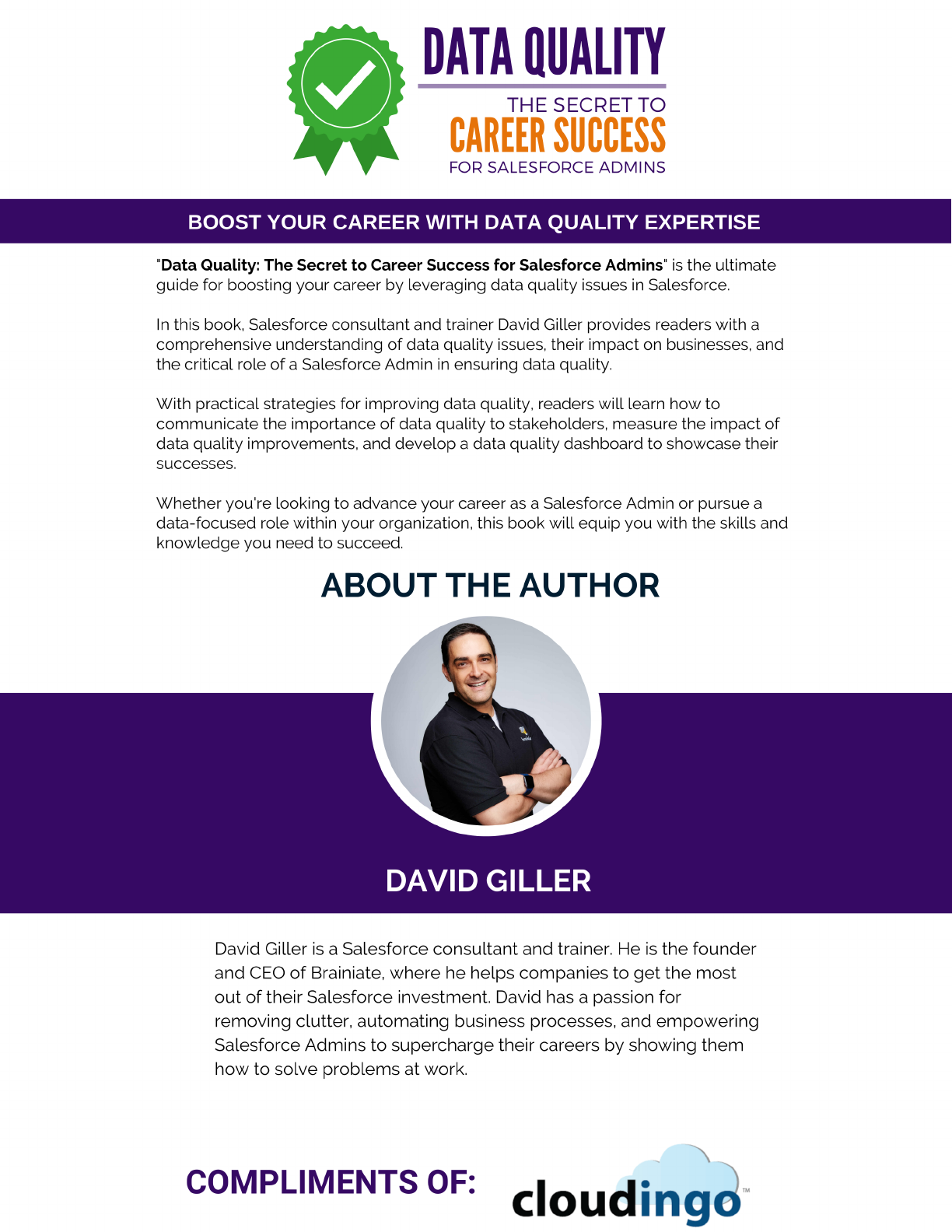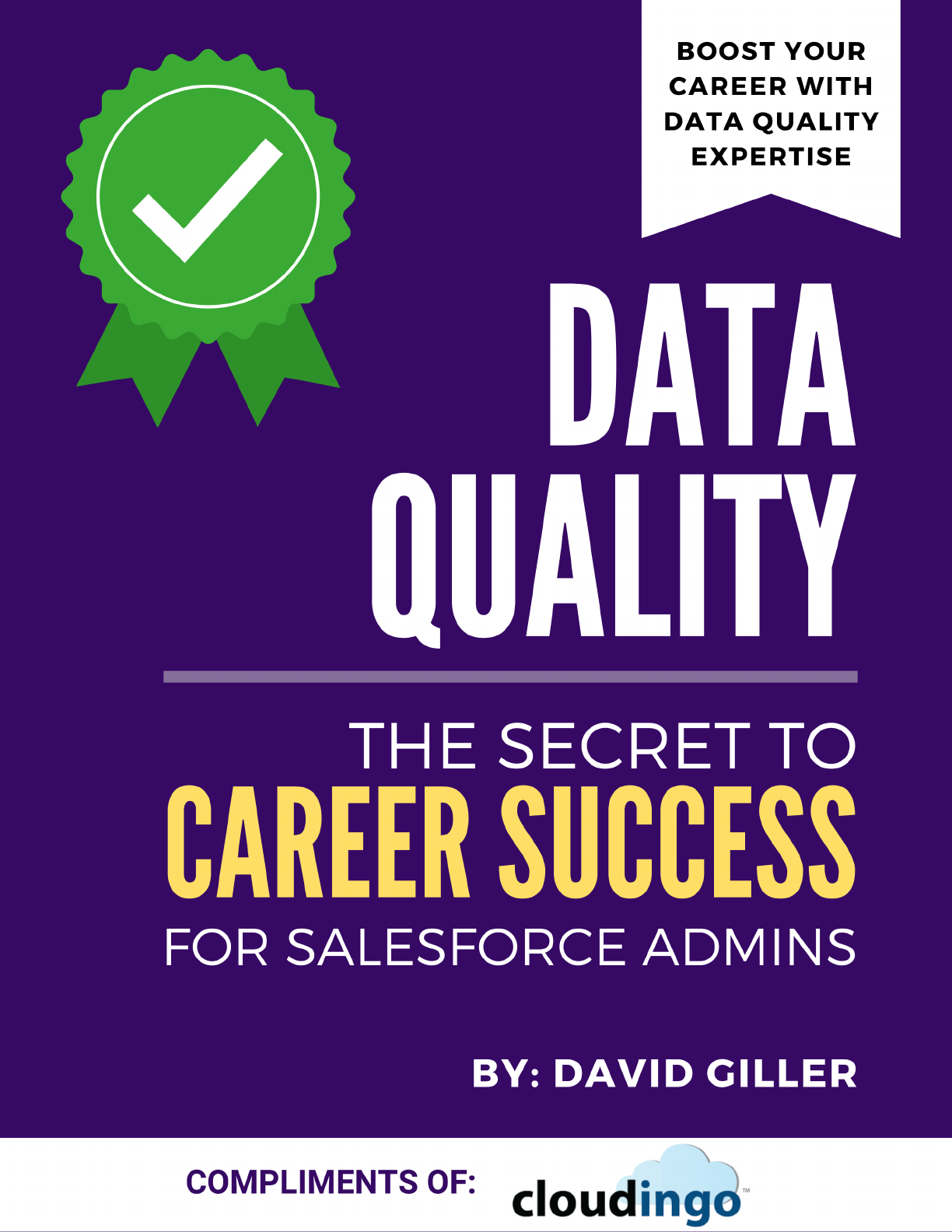

TABLE OF CONTENTS
Introduction 3
Who Is This Book For? 3
The Role of a Salesforce Admin and the Importance of Data Quality 4
Why Should Admins Care About Data Quality? 4
Unlocking Data Quality to Advance Your Salesforce Admin Career 5
The Importance of Data Quality for Salesforce Admins 5
Why Admins Should Prioritize Data Quality 5
What You'll Learn in This Book 5
The Core of Data Quality Mastery 6
Understanding Data Quality in Salesforce 6
What is Data Quality? 6
Importance of Data Quality for Salesforce Admins 6
Ways to Improve Data Quality in Salesforce 6
Common data quality issues in Salesforce 7
Duplicate data 7
Non-compliant data 8
Outdated data 8
Incomplete data 9
The Consequences of Bad Data Quality: Why It Matters to Everyone 9
Inaccurate reporting 9
Bad decision-making 10
Costly errors 10
Damage to relationships 10
Eroded trust 10
The Salesforce Admin’s Role in Achieving Data Quality 10
What Does a Salesforce Admin Do? 10
Maintaining Data Quality 10
Demonstrating the Value of Data Quality to the Organization 11
Communicating the Importance of Data Quality to Stakeholders 12
Explain why good data is critical for decision-making 12
Highlight the potential risks of bad data 12
Outline tangible benefits of strong data governance 12
Focus on long-term solutions instead of short-term fixes 12
Measuring the Impact of Data Quality Improvements 12
Track Performance Before and After Improvements 13
Look at Operational Costs 13
Monitor User Satisfaction Levels 13
Collaborating with Other Teams to Address Data Quality Issues 13
Have an open line of communication 13
Data Quality: The Secret to Career Success for Salesforce Admins | Page 1

Identify potential solutions together 13
Divide responsibilities 13
Keep records 13
Test before implementation 14
Adjust as needed 14
Develop a Data Quality Dashboard to Showcase Improvements in the Company's Data
Quality Initiatives 14
Choose KPIs Carefully 14
Focus on Data Accuracy 14
Create Actionable Metrics 14
Visualize Your Results 14
Advancing Your Career as a Salesforce Admin 15
Leveraging Data Quality Skills To Improve Job Prospects 15
Data quality skills can help you stand out from the competition. 15
Data quality skills can help you get promoted. 15
Data quality skills can help you earn more money. 15
Data quality skills can help you advance your career. 15
Advancing To A Data-Focused Role Within The Organization 15
Become an Expert 16
Build Connections 16
Demonstrate Results 16
Apply Technical Knowledge 16
Introduce Solid Business Decisions 16
Strategies for Improving Data Quality 16
Developing a Data Quality Strategy for Salesforce Admins 16
Identify Your Data Needs 17
Establish Appropriate Quality Standards 17
Develop Reporting Processes 17
Monitor Performance Regularly 17
Adjust Strategies as Needed 17
Best Practices for Maintaining Data Quality in Salesforce 17
Establish Data Governance & Ownership 18
Monitor Data Accuracy & Integrity 18
Validate Information Regularly 18
Analyze & Segment Data 18
Utilize Automation Tools 18
Integrate Third-Party Sources 18
Conclusion 18
About the Author 19
Supercharge Your Data Cleansing with Cloudingo 19
Data Quality: The Secret to Career Success for Salesforce Admins | Page 2

Introduction
Welcome to "Data Quality: The Secret to Career Success for Salesforce Admins." As a
Salesforce Admin, you know firsthand the importance of having accurate and complete data in
your organization's Salesforce instance. However, you may not know that focusing on data
quality gives you a unique opportunity to showcase your skills and significantly impact your
company's success.
In this book, we'll explore how you can leverage data quality issues as a career opportunity to
transform your company, improve productivity and user adoption, and ultimately improve the
bottom line. You'll learn how to identify common data quality issues, such as duplicate records,
missing or inconsistent data, and how to implement best practices for data management in
Salesforce.
Whether you're a seasoned Salesforce Admin or just starting, "Data Quality: The Secret to
Career Success for Salesforce Admins" is your ultimate guide to unlocking the power of data
quality and taking your career to new heights. So let's dive in and get started!
Who Is This Book For?
The book is designed explicitly for Admins responsible for managing their organization's
Salesforce instance and ensuring the accuracy and completeness of its data. If that sounds like
you, then you're in the right place!
By reading this book, you'll gain a deeper understanding of managing data in Salesforce and
learn how to leverage data quality as a career opportunity. You'll learn about data quality best
practices, how to identify common data quality issues, and how to implement solutions to
improve data quality in Salesforce. Whether you're a new Salesforce Admin looking to get up to
speed quickly or a seasoned pro looking to take your career to new heights, this book will help
you achieve your goals.
Data Quality: The Secret to Career Success for Salesforce Admins | Page 3
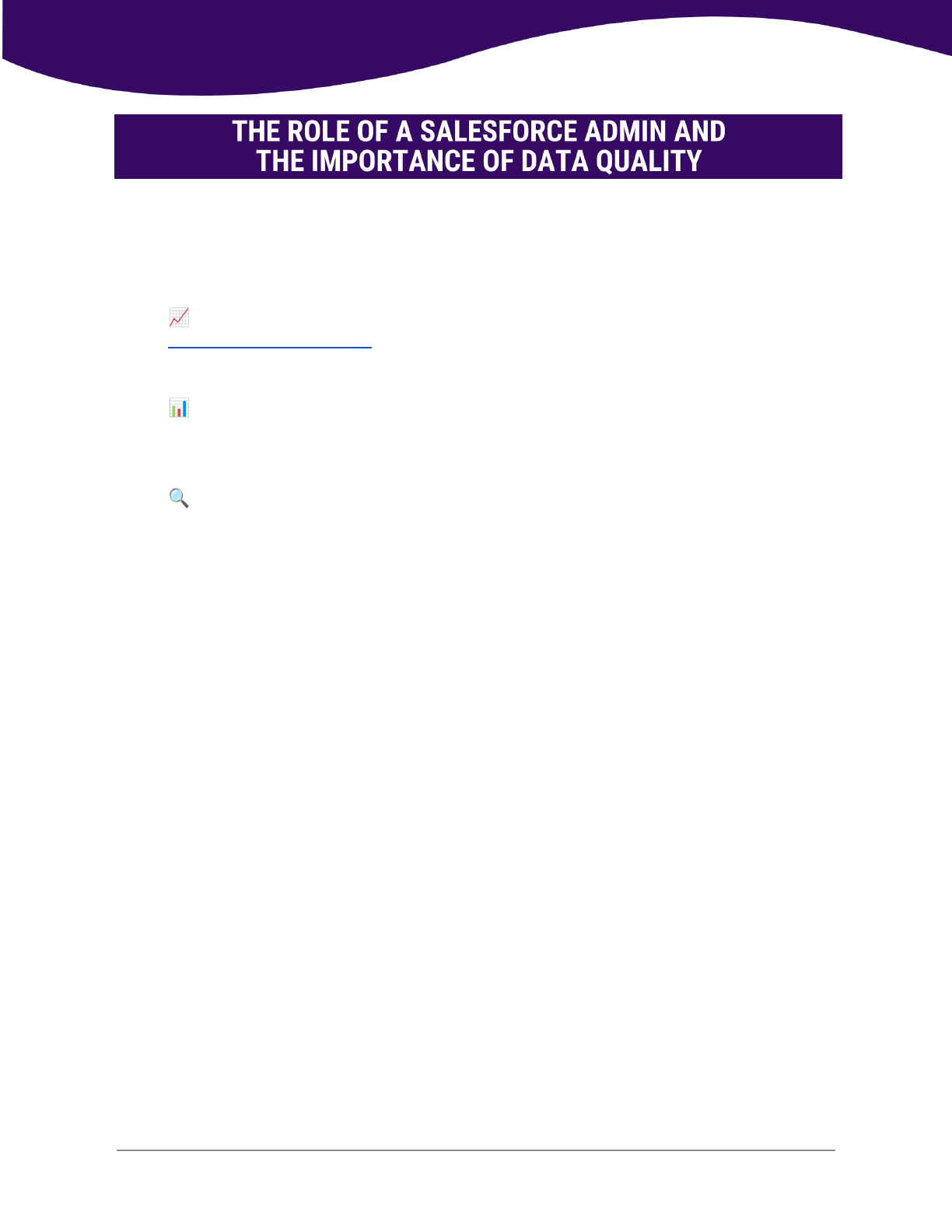
The Role of a Salesforce Admin and the Importance of Data
Quality
Why Should Admins Care About Data Quality?
Companies estimate bad data costs nearly $13 million per year
A recent survey by Gartner reveals that companies estimate bad data to be costing them
almost $13 million yearly.
60% of businesses don't know the actual cost of bad data
Surprisingly, the survey also found that 60% of businesses are unaware of the actual
cost of bad data because they don't measure its impact.
Importance of understanding the impact of bad data
This highlights that most businesses lack a fundamental understanding of how the
quality of data they use affects their business outcomes. Companies need to recognize
the impact of bad data to make informed decisions and take action to mitigate the
problem.
Salesforce Admins are critical in ensuring data accuracy, integrity, and security in cloud-based
applications. As an Admin, you are responsible for managing databases, generating reports,
and developing programs that help to meet organizational goals. Since Salesforce stores large
volumes of data online, it's essential that the information is kept up-to-date and accurate.
Data quality management is designed to ensure data reliability and accuracy in a database. For
example, incoming data can be checked against pre-defined rules before being saved. This
helps to ensure only legitimate information is saved, and no false or corrupt records are present.
Furthermore, regular checks of existing records can be carried out by Admins to ensure the
accuracy and relevance of the stored data.
Having high-quality data is essential in today's business world. Not only does it make it easier to
access and find the information you need, but it also helps to protect your organization from
potential compliance risks, reputation damage, and legal liabilities.
Having a good data quality strategy is critical to ensuring the accuracy and validity of the data
that makes its way into your system. This strategy should include regular reviews to identify any
potential issues before they become too big.
Doing this helps reduce errors or inconsistencies within the database, which can help improve
efficiency by eliminating duplicate or incorrect records. In addition, having high-quality data can
also free up resources for more critical tasks such as customer service or product development.
Data Quality: The Secret to Career Success for Salesforce Admins | Page 4
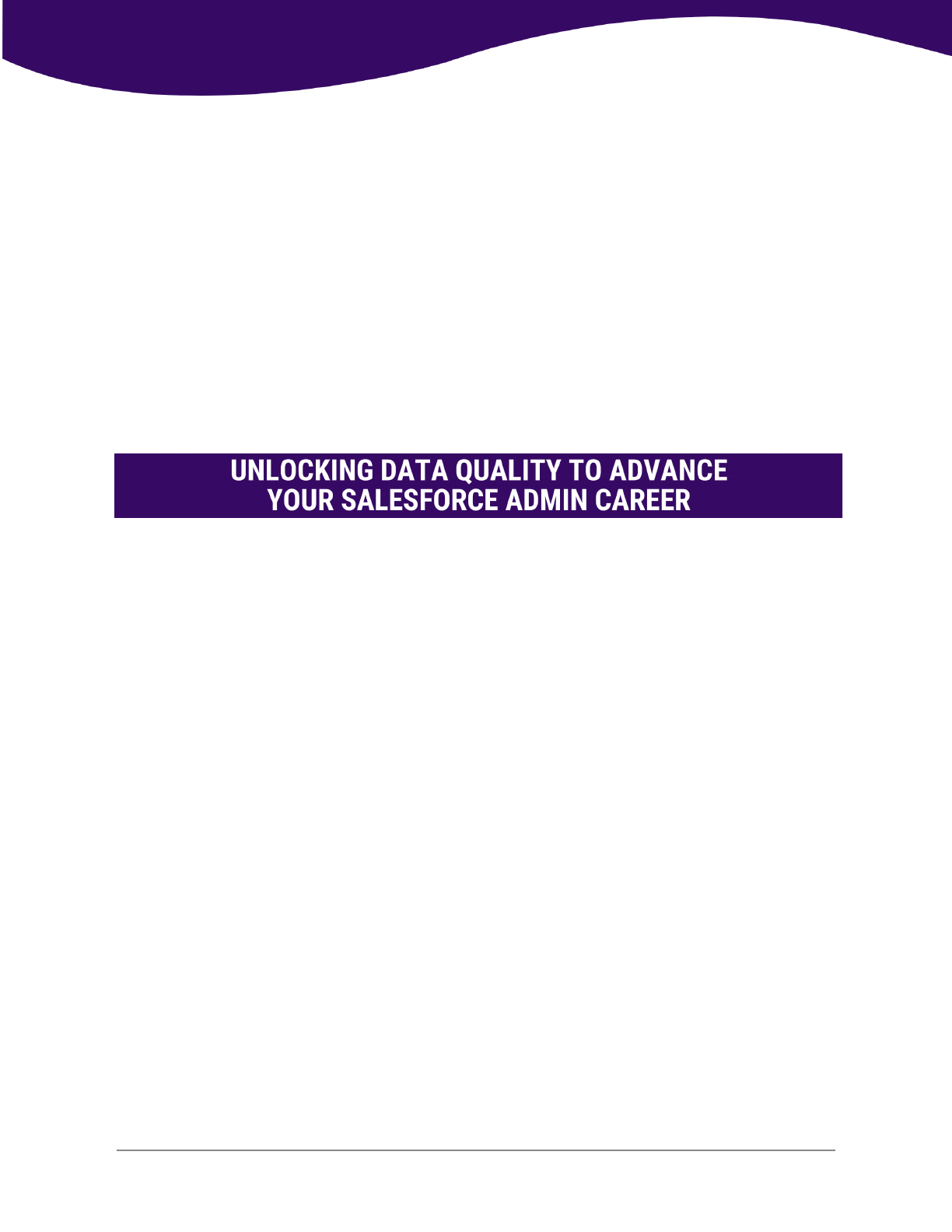
Overall, having high-quality data is essential for any organization as it reduces risk and
enhances accuracy while optimizing efficiency. A comprehensive data quality management
strategy should be implemented to guarantee that the database remains reliable and up-to-date.
Such a strategy should include regular reviews to identify potential problems which can be
addressed promptly. This proactive approach ensures that errors are caught early before
becoming costly issues.
With such a system, Salesforce Admins can ensure their company has clean and organized
databases with fewer unnecessary costs associated with faulty systems or corrupted data.
Clean data facilitate faster decision-making, better customer service, and an improved work
environment.
Unlocking Data Quality to Advance Your Salesforce Admin
Career
The Importance of Data Quality for Salesforce Admins
Data quality isn't just about having clean and accurate data; it's also about having the correct
data in the first place. And having a solid data quality foundation in your Salesforce system can
make the difference between an Administrator who can keep up with the changing needs of
their organization and one who cannot.
Why Admins Should Prioritize Data Quality
Data quality should be at the top of your list for career success as a Salesforce Admin. By
understanding how to implement data governance strategies, recognize common issues with
data quality, and use best practices for managing your Salesforce database, you can maximize
your system's power and become an integral part of any business you work for.
What You'll Learn in This Book
In this book, we'll explore what it takes to master data quality in Salesforce and why it should be
a priority for Admins looking to take their careers to the next level.
In this book, you will learn:
● How data governance strategies help maintain accurate and uniform datasets over time.
Data Quality: The Secret to Career Success for Salesforce Admins | Page 5
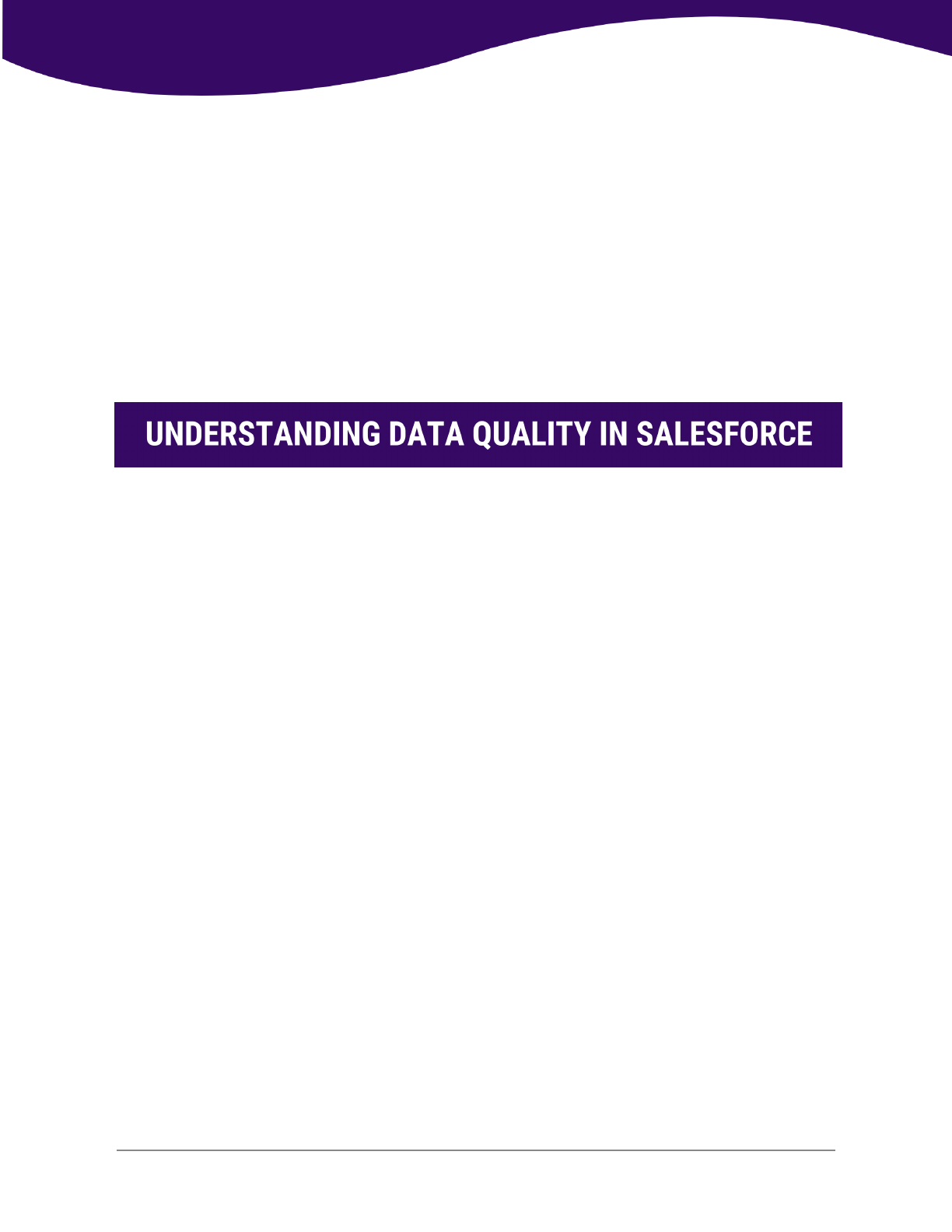
● Common mistakes Admins make when managing their Salesforce database.
● Tips on quickly implementing best practices for optimizing your database and achieving
maximum value from your system.
The Core of Data Quality Mastery
At its core, mastering data quality in Salesforce is all about ensuring that everything in your
system is exactly as it should be—accurate, up-to-date, complete, and consistent. The better
you are at doing this, the more confident you'll be that your organization has access to great
insights from reliable datasets that are ready for analysis whenever needed.
So, let's dive in and unlock the power of data quality for your Salesforce Admin career!
Understanding Data Quality in Salesforce
Data quality is a critical element of success for Admins. As an Admin, ensuring that the data
within your Salesforce org is reliable, accurate, and up-to-date is essential. To do this, you must
understand data quality and how to maintain it in your organization.
What is Data Quality?
Achieving data quality is a cornerstone of effective business operations. Poorly managed data
can lead to disastrous decisions, unnecessary costs, and inefficient processes - something no
organization wants! On the other hand, getting it right unlocks powerful opportunities for
improved decision-making, better profits, and streamlined efficiency across all departments.
Importance of Data Quality for Salesforce Admins
As a Salesforce Admin, you must understand the importance of data quality when managing
your org. Accurate data ensures that users can access reliable information to make informed
decisions quickly and efficiently.
Poorly managed or incomplete data can lead to inaccurate reports or confuse users, slowing
processes and hampering user productivity. Additionally, bad-quality data can lead to
compliance issues with internal policies and state and federal regulations.
Ways to Improve Data Quality in Salesforce
Here are four tips for improving the overall data quality in your org:
● Validate all incoming records – validate any new records coming into your system
before they are added to ensure they meet specific standards. This could include
Data Quality: The Secret to Career Success for Salesforce Admins | Page 6

checking for valid phone numbers or email addresses, ensuring only authorized users
are allowed access, etc.
● Automate manual checks – use background checks on existing records instead of
manually entering information every time a change or addition is made in the system.
Automation allows for more accurate and efficient processing of changes without
sacrificing speed or accuracy.
● Integrate with external systems – integrating external databases with your Salesforce
instance will allow faster and easier validation of incoming records and updates between
systems whenever changes are made externally (e.g., updates from customer service
software).
● Analyze existing records – regularly check existing records for errors or
inconsistencies by running analytics reports on them so you can identify any potential
problems quickly before they become more significant issues down the line.
These simple steps will go a long way toward improving the integrity of your org’s data,
ultimately leading to better decision-making, improved user productivity, and increased profits!
Common data quality issues in Salesforce
Understanding common data quality issues in Salesforce can help businesses get the most out
of their data structures. Typical problems that arise from Salesforce include redundant or
incorrect data, duplicated accounts or contacts, and missing fields.
Poor data maintenance processes can result in poor user adoption, lost or inaccurate reports, or
limited access to critical tools. Considering these issues is essential for all users when working
with Salesforce to ensure a clean database and optimal performance.
Regularly checking your data and performing preventative maintenance at least twice a year is
critical to preventing any costly mistakes due to incorrect data.
Duplicate data
Duplicate records are a perennial problem in Salesforce systems and can be a significant
obstacle to success for Salesforce Admins. Put simply, duplicate data occurs when two or more
records contain the same information but have different unique identifiers. This can manifest in
many ways, such as having multiple Contact records for the same person or having multiple
accounts for just one company.
The main risk of duplicate data is that it leads to inaccurate reporting and decision-making. The
presence of duplicates can confuse users and create information gaps. It also makes extra work
for Salesforce Admins, as they must constantly monitor their system to ensure accuracy and
eliminate any duplicates they find.
Data Quality: The Secret to Career Success for Salesforce Admins | Page 7

Unfortunately, due to its complexity, duplicate data can be challenging to detect and remove. If
an Admin doesn't manually delete it, it could remain undetected for months or even years –
leading to further errors.
To prevent this, Salesforce Admins should take proactive steps to identify potential duplicates
before they occur. This includes using master record management tools and deduplication
techniques such as fuzzy matching algorithms and automated processes.
Additionally, regular audits should be conducted to ensure accuracy and reduce the amount of
manual effort required. Finally, Admins should train their teams on proper data entry protocols
and emphasize the importance of preventing duplicate data from entering the system in the first
place.
Non-compliant data
Business users must recognize that non-compliant data needs to meet specific standards or
rules. It's like when you have to follow the directions in school, like not running in the hallway or
overeating candy.
But instead of following classroom rules, non-compliant data means the information isn't
formatted correctly or is missing some crucial details. For example, entering customer
information into a system might require a specific combination of characters for the First Name
and Last Name fields. Non-compliant data would be anything entered into those fields that didn't
match what was expected.
Non-compliant data can also mean that some information is missing completely – like if a
customer's address wasn't filled out correctly or provided. Data can also be non-compliant if it
includes too much unnecessary information – like if someone wrote their entire life story instead
of just providing their name and address!
All the data needs to be accurate and current so companies can make good decisions. That's
why Salesforce Admins need to know how to spot non-compliant data and fix any problems
immediately! Keeping good quality data is an essential skill for success as an Admin.
Outdated data
Outdated data is information that used to be helpful but has been changed or replaced. It's like
old food in your refrigerator - it looks the same, but it's not as good as it used to be.
Outdated data can cause problems for Salesforce Admins because they need up-to-date and
accurate information when working with customers or clients. For example, a Sales rep trying to
find your address might refer to your outdated information and send something to the wrong
place.
To prevent this from happening, Salesforce Admins must use the most current and reliable data
available. This means they will use sources like customer surveys, online forms, customer
Data Quality: The Secret to Career Success for Salesforce Admins | Page 8

feedback, and other kinds of input that can help them track changes and make sure the data
they're using is relevant and correct.
By using only current and reliable sources of information, Salesforce Admins can ensure their
customers get the best service possible. This helps increase customer satisfaction which leads
to more business for the company!
Incomplete data
Incomplete data doesn't have all the necessary information and needs some critical pieces like
names or numbers. Think of it like a puzzle: if you only have half the details, it's impossible to
know what the picture looks like when you put it all together.
When incomplete data is used for business purposes, it can be a real problem. With enough
information, decision-makers can make informed decisions and act on the right ones, and that
can lead to wasted time, money, and missed opportunities.
Data accuracy is important because inaccurate data can lead to incorrect conclusions and bad
decisions. For example, if you had a list of people with only their first name and not their last
name, you wouldn’t be able to tell if there were any duplicates on the list, which could cause
problems when trying to reach out to them later on.
Businesses, like people, need accurate information to make good decisions. A complete data
set lets them get answers quickly and trust that it will lead them to success. By having accurate
information, businesses can act fast and be sure they are making the right decision. This helps
them stay ahead of their competition and succeed in the long run!
The Consequences of Bad Data Quality: Why It Matters to Everyone
The impact of poor data quality on business is often underestimated. Poor data quality can lead
to inaccurate reporting, bad decision-making, and costly errors. It can also damage relationships
with customers and partners, eroding an organization's trust.
Data quality is critical to the success of any business. Inaccurate or incomplete data can have a
ripple effect throughout an organization, causing problems that are difficult to track and fix. The
impact of poor data quality can be especially devastating for small businesses, which often lack
the resources to manage their data effectively.
Poor data quality can lead to many problems, including:
Inaccurate reporting
Poor data quality can lead to inaccurate financial reports, making it difficult to make sound
decisions about the future of the business. Incomplete data can also make it difficult to measure
progress and track goals.
Data Quality: The Secret to Career Success for Salesforce Admins | Page 9

Bad decision-making
Incomplete or inaccurate data can lead to bad decision-making at all levels of the organization.
Poor data quality can cause managers to make decisions based on incorrect information, which
can harm the business.
Costly errors
Poor data quality can lead to errors in inventory management, production planning, and other
business areas. These errors can be costly and time-consuming to fix.
Damage to relationships
Poor data quality can damage customer, partner, and supplier relationships. Inaccurate
information can lead to miscommunication and misunderstanding, damaging trust and goodwill.
Eroded trust
Poor data quality erodes trust in an organization. Employees who cannot trust the data they are
working with are less likely to be productive, and customers who cannot trust the data they
receive are less likely to do business with the company.
The Salesforce Admin’s Role in Achieving Data Quality
For many organizations, Salesforce Admins are the first line of defense against data quality
problems. The Salesforce Admin ensures data accuracy and consistency by creating processes
that govern how users access and update data. They also have a critical role to play in the
long-term maintenance of accurate and up-to-date information.
In this section, we’ll explore some of the typical responsibilities of Salesforce Admins to ensure
data quality for their organization.
What Does a Salesforce Admin Do?
A Salesforce Admin’s primary responsibility is to manage user access and permissions, create
roles, profiles, and page layouts and validate rules to ensure proper security and data control.
They also handle requests from users regarding system functionality or report generation.
On top of these tasks, they can also ensure data integrity by keeping track of changes made to
records and fields over time. It’s their job to ensure the right people have access to the right
pieces of data within a secure environment where no one else can gain access without
permission.
Maintaining Data Quality
Keeping accurate records is integral for any organization’s success, so a Salesforce Admin
must closely monitor the quality of an organization's data. Here are some ways Admins can help
maintain high-quality data:
Data Quality: The Secret to Career Success for Salesforce Admins | Page 10
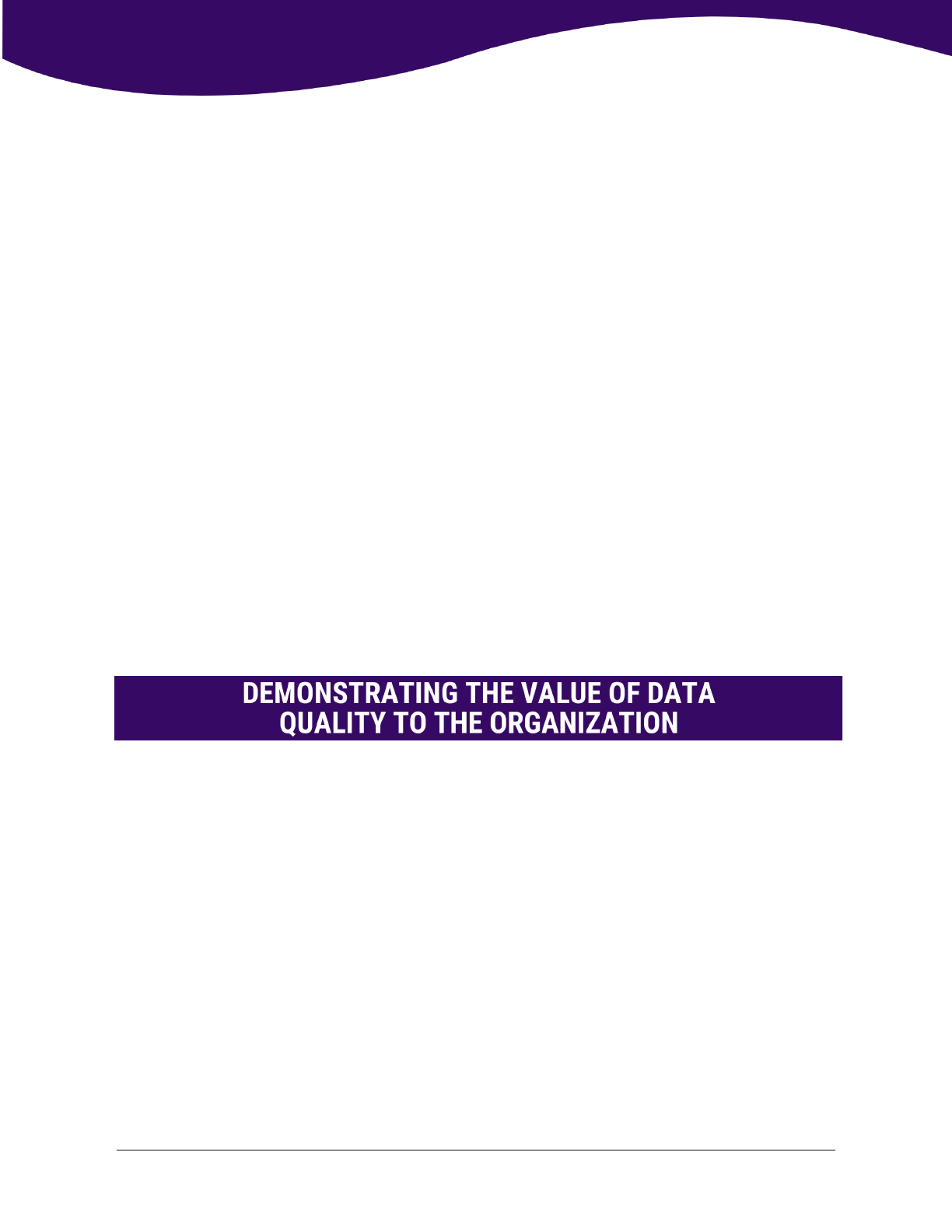
● Establishing Guidelines & Policies: Admins should set up policies around how records
should be created and how they should be filled out so that everyone is on the same
page when it comes to entering information into the system correctly. These guidelines
will help keep users consistent in their approach when inputting new records or updating
existing ones, so there are fewer mistakes down the line.
● Defining Data Entry Standards: A good practice for Admins is always setting standards
so that everyone knows what constitutes valid input in terms of formatting (case
sensitivity), date formats, etc., along with any other relevant rules governing forms used
by end users.
● Setting Up Database Cleanup Tasks: To ensure that all entries are complete and free
from duplicates or errors, Admins should routinely audit their databases for any potential
issues like typos or outdated information that could lead to discrepancies down the line if
not addressed quickly enough.
● Creating Monitoring & Reporting Mechanisms: Regular audits can help keep
databases clean from anomalies, but setting up automated reports allows Admins to
have better insights into their overall data health at any given time by tracking changes
made over time or highlighting any inconsistencies between different parts of an
organization's database architecture quickly.
Having processes that allow Admins to identify issues with data accuracy quickly is critical to
ensure quality information is available whenever needed. A solid understanding of these
practices will help prevent costly missteps due to bad decisions based on faulty information –
something every Admin should strive towards!
Demonstrating the Value of Data Quality to the Organization
As a Salesforce Admin, demonstrating the value of data quality to the organization is essential
for success. Keeping users updated about new changes to data quality and explaining why
these changes are essential will help ensure ongoing compliance with standards.
Developing reports or dashboards that show data accuracy trends or areas of improvement that
have been made since implementing Salesforce are effective ways of reporting data quality
results. Moreover, gathering customer feedback regularly can help determine if changes have
improved their experience.
Ultimately, providing demonstration and proof of the value of data quality for the organization
helps build awareness and establish buy-in from all stakeholders.
Data Quality: The Secret to Career Success for Salesforce Admins | Page 11

Communicating the Importance of Data Quality to Stakeholders
When communicating the importance of data quality to stakeholders, it’s important to be
articulate and clear. After all, data quality directly impacts a business’s success and even its
survival.
Here are some key points to consider when discussing data quality with stakeholders:
Explain why good data is critical for decision-making
Quality data helps make better decisions based on sound trends rather than guesswork. With
reliable insights, company leaders can formulate strategies that will advance the business
meaningfully.
Highlight the potential risks of bad data
Poorly managed databases can lead to inaccurate analysis, communication errors, and
potentially costly mistakes. By having everyone understand the risks related to poor data quality,
they’ll become more aware of how their decisions affect the organization.
Outline tangible benefits of strong data governance
Data governance is an essential part of maintaining high-quality standards. Companies can
save time, money, and resources by implementing effective processes that promote database
accuracy and reliability.
Focus on long-term solutions instead of short-term fixes
While it might be tempting to take shortcuts to address issues related to bad data quickly, this
approach often creates more significant problems down the road. Instead, explain how
long-term solutions such as better system integration or improved training can help ensure
sustainable success for years ahead.
When collaborating with stakeholders regarding data quality, it’s essential to focus on technical
details and emphasize how good quality impacts business outcomes positively and negatively.
Doing so will help establish trust and create greater organizational alignment around ensuring
that only accurate information is used going forward.
Measuring the Impact of Data Quality Improvements
Salesforce Admins know all too well that the quality of the data in their system is a critical factor
in success. But how do you measure the impact of data quality improvements?
Here’s a guide on how to do so for Salesforce Admins:
Data Quality: The Secret to Career Success for Salesforce Admins | Page 12

Track Performance Before and After Improvements
One way to measure the impact of data quality is to compare performance before and after
making improvements. This will give you a good indication of whether your changes had an
impact.
Look at Operational Costs
Another effective way is to look at how much it costs to operate with a given level of quality.
Analyzing operational costs can help you identify areas where data quality can be improved and
provide valuable insight into the most efficient processes.
Monitor User Satisfaction Levels
Lastly; you should monitor user satisfaction levels when using your data. By tracking user
satisfaction levels, you can gauge the effectiveness of your data quality initiatives and make
adjustments if needed.
By following these steps, Salesforce Admins can effectively measure the impact of their data
quality improvements and make sure they’re getting the most out of their system.
Collaborating with Other Teams to Address Data Quality Issues
As a Salesforce Admin, you will likely be called upon to help address data quality issues in your
organization. To do this successfully, it's essential to understand how you can work effectively
with other teams and departments in the organization. Here are some critical tips for
collaborating with others:
Have an open line of communication
Ensure everyone involved knows the data quality issues and their impact on the business. Set
up regular meetings with the other teams and stakeholders to discuss progress and ensure
everyone is on track.
Identify potential solutions together
Work with the other teams to identify solutions for the data quality issues. Brainstorm ideas,
share best practices, and develop creative strategies for finding solutions for your organization.
Divide responsibilities
Assign tasks and responsibilities to each team based on their strengths and experience. This
will ensure everyone understands their role in addressing the data quality issue.
Keep records
Implement processes that document all changes made while addressing data quality issues.
This will help you keep track of improvements over time and provide valuable insight into how
your team has addressed similar problems in the past.
Data Quality: The Secret to Career Success for Salesforce Admins | Page 13

Test before implementation
Once proposed solutions have been identified, test them before implementing them
enterprise-wide. This will help prevent any unforeseen problems once they are implemented
across the organization’s systems or used by end users.
Adjust as needed
As changes are made, stay flexible and adjust based on feedback from stakeholders or
end-users. This will ensure that any new implementations meet everyone's needs and
expectations.
Develop a Data Quality Dashboard to Showcase Improvements in the
Company's Data Quality Initiatives
Creating a data quality dashboard for Salesforce Admins is essential to any data quality
initiative. A data quality dashboard allows you to showcase improvements in data quality over
time and easily track critical metrics for data accuracy and completeness.
Having these key performance indicators (KPIs) on a single page lets you quickly see what
areas need improvement and where the company has successfully improved its data quality.
Here are some tips on developing an effective data quality dashboard:
Choose KPIs Carefully
When choosing KPIs for your dashboard, it’s crucial to identify the metrics most important to
your business needs. For example, if customer satisfaction is a priority, choose KPIs that
measure customer satisfaction rather than other less relevant metrics.
Focus on Data Accuracy
To ensure your dashboard is valuable, focus on metrics that measure data accuracy rather than
just overall volume. The number of records entered into the system may not be as important as
the accuracy or validity of those records.
Create Actionable Metrics
Ensure to include actionable metrics so Admins can quickly identify areas that need
improvement and take action accordingly. For example, one KPI could show how many records
have been corrected or updated in the past week or month.
Visualize Your Results
Consider using visualizations such as charts and graphs to help make your results more
meaningful and easier to understand. This will also provide more context around any trends you
may observe with your KPIs over time.
Data Quality: The Secret to Career Success for Salesforce Admins | Page 14
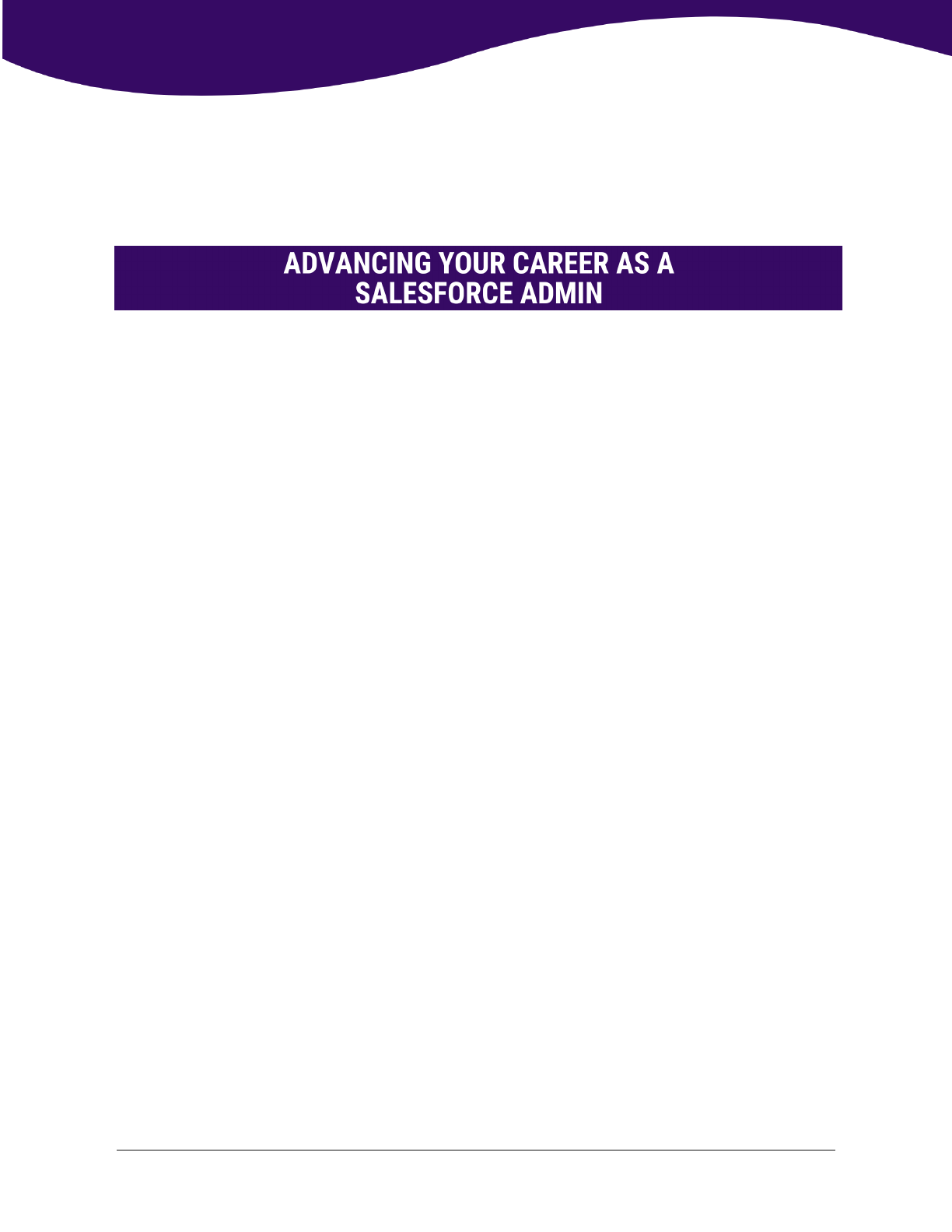
By implementing these tips, Salesforce Admins can create a compelling and informative data
quality dashboard that helps them track progress toward their goals and identify opportunities
for further improvement. With the right visualizations, business leaders can quickly spot
problems before they become more significant while highlighting successes they should be
proud of!
Advancing Your Career as a Salesforce Admin
Leveraging Data Quality Skills To Improve Job Prospects
Data quality skills are in high demand for Salesforce Admins. Leveraging these skills can
improve job prospects. Here are some ways that data quality skills can help you get ahead in
your career:
Data quality skills can help you stand out from the competition.
Data quality skills can help you stand out in a competitive job market. Hiring managers are
looking for candidates who can clean and manage data, and demonstrating these skills can give
you a significant advantage.
Data quality skills can help you get promoted.
If you’re already a Salesforce Admin, developing data quality skills can help you get promoted.
Companies are always looking for ways to improve their data management, and meeting this
need can put you on the fast track to success.
Data quality skills can help you earn more money.
Companies are willing to pay top dollar for employees who have data quality skills. If you want
to earn more money, developing these skills is a great way to do it.
Data quality skills can help you advance your career.
Whether you want to get promoted or earn more money, data quality skills can help you
advance your career. If you want to be successful in the field of Salesforce Administration,
developing these skills is essential.
Advancing To A Data-Focused Role Within The Organization
Adopting a data-focused mindset offers several advantages for career progression within the
organization. Here are some critical ways that mastering data quality can help you expand your
career opportunities:
Data Quality: The Secret to Career Success for Salesforce Admins | Page 15
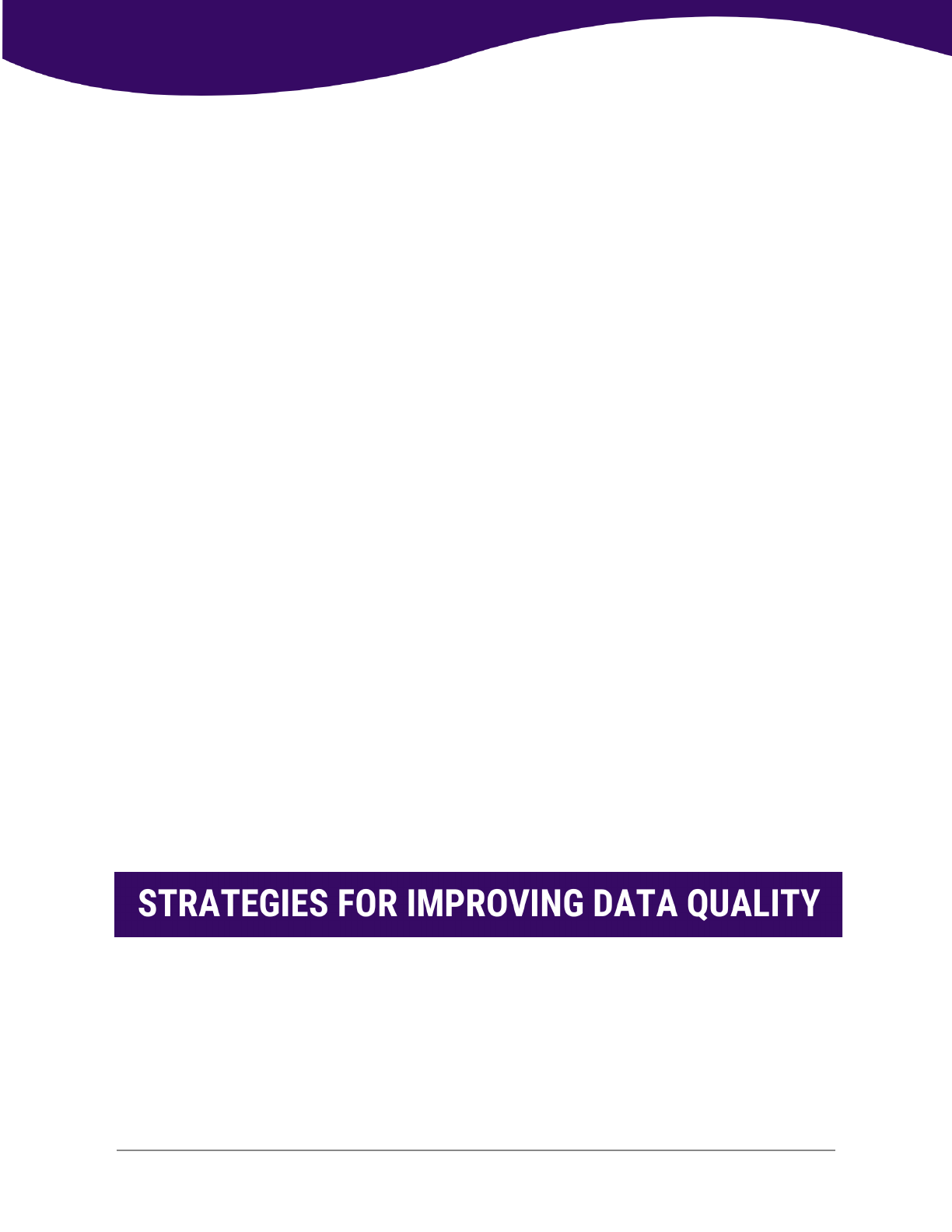
Become an Expert
By learning how to analyze, evaluate, and improve organizational data quality, you can become
an invaluable expert who can lead initiatives such as implementing new technologies or
designing better database management processes.
Build Connections
When it comes to advancing your career, networking is essential. Having a solid understanding
of data quality will give other professionals across departments a deeper appreciation for your
knowledge and skillset when interacting with you at conferences and events.
Demonstrate Results
As you become more knowledgeable about improving the value of your organization’s data
assets, it will be possible to demonstrate meaningful results from the projects that have been
undertaken. This tangible proof further illustrates effective data management's impact on a
business's bottom line.
Apply Technical Knowledge
Every company needs technical experts who understand how their systems work and how they
integrate with existing ones. By gaining expertise in areas such as automation tools or ETL
methods for loading/transforming big datasets, you can quickly move up the corporate ladder by
becoming an invaluable asset.
Introduce Solid Business Decisions
High-quality information is fundamental for making informed decisions in any sector or industry
today. If you can provide accurate insights derived from reliable sources, then this will form part
of your value proposition when negotiating promotions or salary increases.
By pursuing excellence in data quality techniques and best practices, Salesforce Admins can
position themselves at the forefront of their organizations' success stories while advancing their
careers!
Strategies for Improving Data Quality
Developing a Data Quality Strategy for Salesforce Admins
As Salesforce Admins, data quality can be the difference between success and failure in your
career.
Data Quality: The Secret to Career Success for Salesforce Admins | Page 16

Developing an effective data quality strategy ensures your organization gets the most out of its
technology investments.
Here are some tips on developing a comprehensive data quality strategy:
Identify Your Data Needs
Before developing a data quality strategy, you must identify the data your organization needs to
succeed. This includes understanding what reports and analyses are expected from the
software, what information will be used for decision-making, and which metrics should be
tracked over time.
Establish Appropriate Quality Standards
Once you have identified your data needs, it's essential to establish appropriate quality
standards for each data type. This includes setting acceptable levels of accuracy, completeness,
timeliness, validity, and consistency.
Additionally, organizations should determine how often they will review their standards and
update them if necessary.
Develop Reporting Processes
Establishing reporting processes helps keep track of data accuracy over time. Organizations
should create clear instructions on how errors should be reported, who should report them (e.g.,
team members or end-users), and which teams or individuals have final responsibility for
resolving any issues.
Monitor Performance Regularly
Once reporting processes are in place, it's essential to regularly monitor performance against
those standards to ensure that gaps in quality don't occur or worsen over time. This includes
analyzing trends in accuracy levels across various datasets and taking corrective action when
necessary (e.g., additional training or process improvements).
Adjust Strategies as Needed
Finally, as organizational needs change or new technologies become available, organizations
should adjust their strategies accordingly to stay ahead of the curve concerning data quality
management. Keeping up with industry trends and best practices can help ensure that an
organization’s data remains valuable throughout its lifecycle.
Best Practices for Maintaining Data Quality in Salesforce
Data quality is essential for any business to thrive. Salesforce Admins are critical players in
ensuring their organization has a reliable source of accurate data.
Here are some best practices to consider when maintaining data quality in Salesforce:
Data Quality: The Secret to Career Success for Salesforce Admins | Page 17
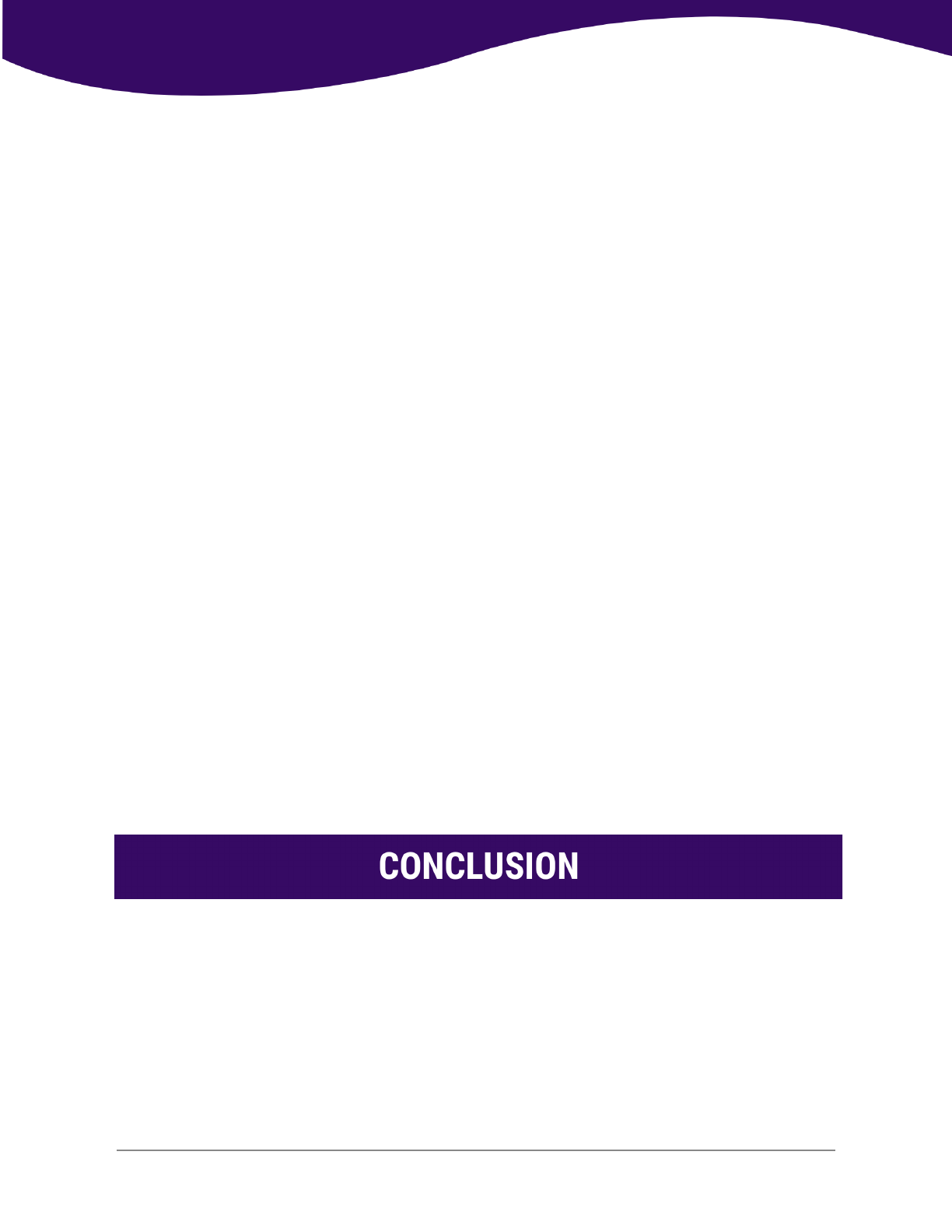
Establish Data Governance & Ownership
Establishing a clear data governance policy with designated roles and responsibilities for
keeping data clean and up-to-date is critical. The person responsible for the ownership of the
data should have complete control over it and be responsible for ensuring its accuracy.
Monitor Data Accuracy & Integrity
Closely monitor all data sources to detect any discrepancies or misleading information. It’s
essential to regularly check the integrity of fields or records and their formatting.
Validate Information Regularly
Verify that all contact information is valid before using it in campaigns or other initiatives. Set up
a verification process before sending out content such as emails, newsletters, etc., so only
accurate contact records are included in the distribution list.
Analyze & Segment Data
Use analytical tools to understand customer needs and segment them according to different
criteria. This will help you target your audience more effectively with appropriate content and
offers.
Utilize Automation Tools
Automating processes like lead scoring can help Salesforce Admins identify qualified leads
quickly and accurately. Automation tools can also ensure consistent standards are followed
when capturing leads from different sources (websites, events, etc.).
Integrate Third-Party Sources
Integrating third-party information sources into your database can provide valuable insights
about your customers that help improve engagement strategies and better target your offerings.
However, ensure this information is updated regularly by keeping track of changes in the
external source(s).
Conclusion
As a Salesforce Admin, data quality is the key to success and growth. With proper data
management, you can reap the rewards of increased efficiency, accuracy, and improved
customer satisfaction. You can also improve your job security by quickly identifying any
problems with your data before they become significant issues. Data quality is truly the secret to
career success for Salesforce Admins!
Data Quality: The Secret to Career Success for Salesforce Admins | Page 18

Understanding how to recognize and maintain good data quality in Salesforce sets you up for
long-term success as a Salesforce Admin. Whether through automation processes for improving
data governance or manual methods like data cleansing and validation, you can equip yourself
with the skills to ensure that your data remains accurate and up-to-date. This knowledge will
help you better serve your clients and create more security as an Administrator.
About the Author
David Giller is a seasoned Salesforce consultant and trainer with over a decade of experience in
the Salesforce ecosystem. Since 2007, David has been helping Fortune 500 companies
optimize their Salesforce systems and streamline their processes using the Salesforce platform.
David's expertise in Salesforce has allowed him to help organizations improve their sales and
marketing efforts, increase productivity, and drive business growth. He is known for his ability to
take complex Salesforce concepts and make them accessible and easy to understand for his
clients and students.
In addition to his work as a consultant and trainer, David is also an avid blogger and public
speaker at Salesforce events. His blog, The Brainiate Show, is a go-to resource for Salesforce
professionals looking for tips and best practices for using Salesforce effectively. David's online
courses at Brainiate Academy feature courses and other resources to help Salesforce Admins
advance their careers in the Salesforce ecosystem.
With his extensive experience and passion for Salesforce, David is the perfect guide to help you
navigate the complex world of Salesforce and get the most out of your Salesforce system.
So whether you're a seasoned Salesforce professional or just starting, you can trust David's
expertise and guidance to help you succeed.
Supercharge Your Data Cleansing with Cloudingo
In today's data-driven world, the accuracy and completeness of your organization's data are
more critical than ever. That's why we're excited to introduce you to Cloudingo – the
AppExchange app for Salesforce that can help you supercharge your data cleansing efforts and
transform how you manage your data.
With Cloudingo, you can identify and merge duplicate records, standardize and normalize data,
and perform complex data transformations – all in a fraction of the time it would take to do
manually. Plus, with its easy-to-use interface and powerful automation features, you can
streamline your data cleansing process and free up more time to focus on other essential tasks.
Some of the critical features of Cloudingo include the following:
● Duplicate record management: Identify and merge duplicate records, including
contacts, leads, accounts, etc.
Data Quality: The Secret to Career Success for Salesforce Admins | Page 19

● Data standardization: Normalize your data by standardizing values across fields,
removing extraneous spaces and characters, and more.
● Data enrichment: Enhance your data by appending missing information from external
sources, such as email addresses or phone numbers.
● Complex transformations: Perform complex data transformations with just a few clicks,
such as splitting or concatenating fields.
By using Cloudingo, you can improve the accuracy and completeness of your organization's
data, save time, and increase productivity.
So why wait?
Explore the power of Cloudingo today and start supercharging your data-cleansing efforts in
Salesforce!
Data Quality: The Secret to Career Success for Salesforce Admins | Page 20
